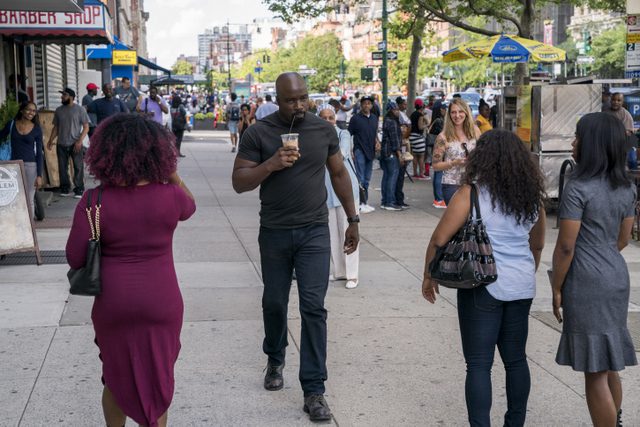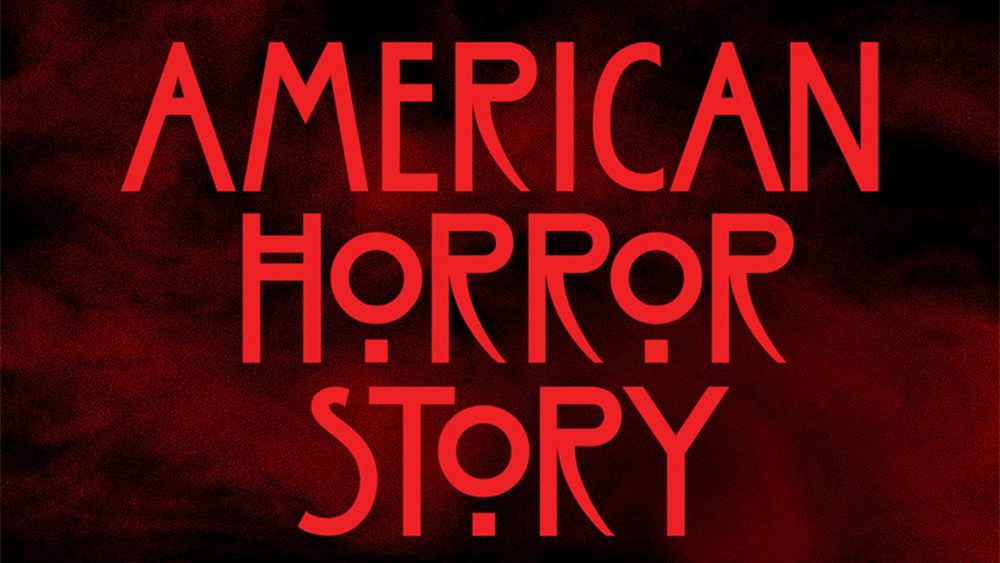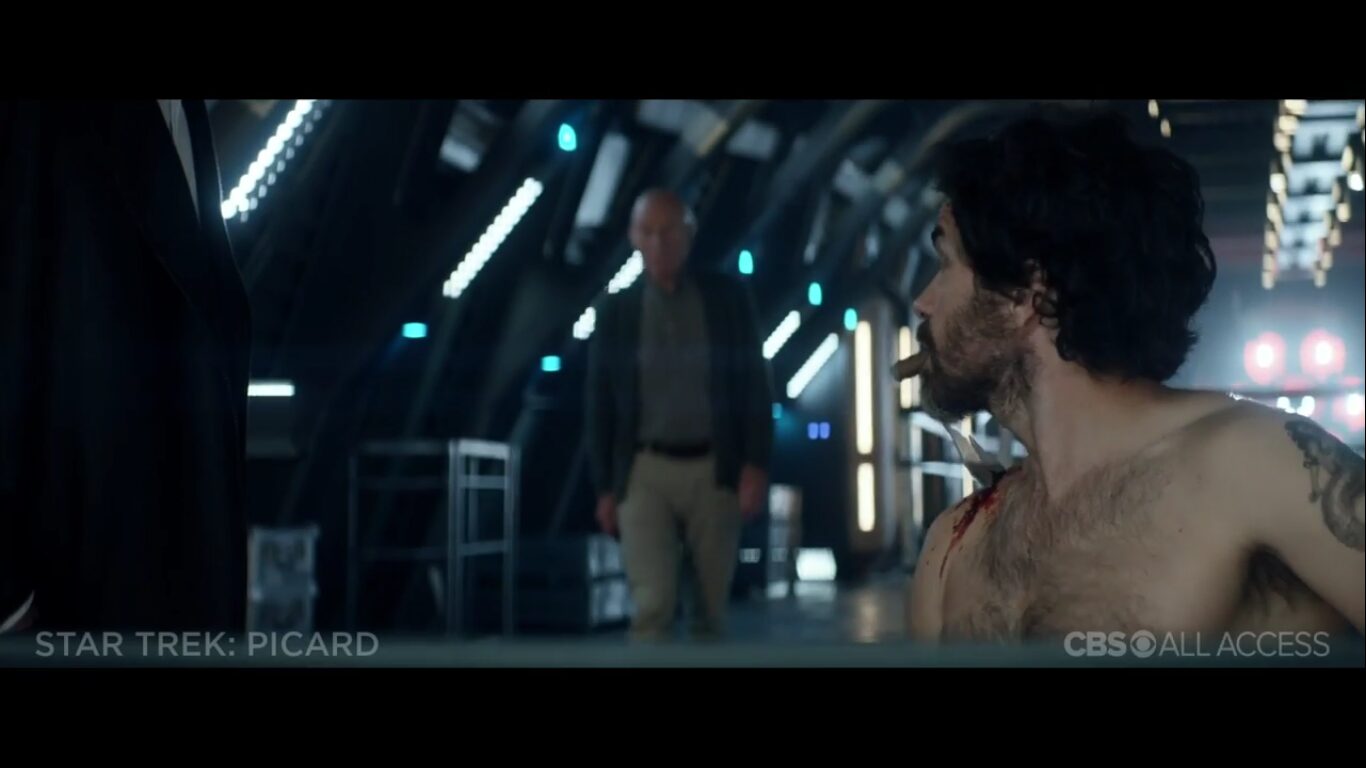The smartest thing that Luke Cage does in its season two premiere, “Soul Brother #1,” is start in the middle of the action. This has always been a show that embraces its setting more than most Marvel properties – the New York of the Avengers movies has always been curiously anonymous (although Marvel’s Netflix properties, this and Daredevil especially, have a distinct layer of grime that sets them apart). By contrast, the Harlem of Luke Cage is as vibrant as the show’s stellar soundtrack. Starting mid-scene is a solid way to show that these characters have lives that exist before and after the credits roll. “Soul Brother #1” begins with Luke breaking up a drug lab that manufactures a kind of heroin not-so-affectionately named Luke Cage. It’s a bitter piece of irony, casting Luke as both Harlem’s savior and its damnation. As foreshadowing, it works nicely, hinting at Luke’s changed station in the world.
Luke has been changed, internally and externally, by the events of last season, and The Defenders. He is still single-mindedly committed to cleaning up Harlem, but struggles with the pressure of his new folk-hero status. The show does an expedient job establishing this, although it seems to mostly exist in the confines of an early-episode montage, set against a reverend (Reg E. Cathey) practicing a sermon, in which he exhorts his congregation not to idolize Luke Cage, but to become their own heroes.
Overall, we’re mostly told about the changes in Luke’s life, which can be chalked up to a strangely subdued performance from Mike Colter. Luke is still as corny and romantic as ever (one of his most endearing, humanizing traits), but for much of “Soul Brother #1” Colter seems disengaged from the material, until a few scenes at the end of the episode where he allows Luke’s sense of play to come to the forefront. Colter isn’t bad, not exactly, but it’s hard to tell if he’s playing into Luke’s stoic nature or just ceding scenes to actors who want to go bigger with their performances.
Those performances, by the way, are across-the-board great. Marvel shows (and, let’s face it, movies) have long had a villain problem, in that they’re either put on ice (such as Daredevil‘s Kingpin) or killed off way too soon (like Jessica Jones‘ Kilgrave). Keeping Theo Rossi’s Shades and Alfre Woodard’s Mariah Dillard in the mix was a smart move on Luke Cage‘s part; it affords a sense of continuity, which plays, strangely enough, into the sense of community that the show is trying to cultivate: Harlem as a small town. Rossi and Woodard are fantastic together. Their performances complement each other nicely: Shades is intense and taciturn, Dillard showy and abrasive. They have a fun scene at a nightclub, when a waiter assumes they’re aunt and nephew. Mariah starts suggestively sucking Shades’ thumb, while he stares daggers at the waiter until he leaves (it looks more like an escape). It encapsulates their relationship succinctly: weirdly funny, very sexy, and unmistakably dangerous. Shades and Mariah are perfect foils for each other, and they just love being bad guys. Sure, sometimes it threatens to take the show too far into comic-book territory, but as of now, Rossi and Woodard are playing at the exact right pitch.
Conversely, I find it harder to care about Luke and Claire. Rosario Dawson has done fine work with the character, but from a writing standpoint, I’ve always felt as though Claire has been defined in her relationship to people like Matt Murdoch and Danny Rand. It doesn’t feel like Dawson has ever been able to fully put her stamp on the character, but she makes some strides in that direction in this episode. She and Luke have a nice scene where she refuses to be a damsel; far from making Luke look one-sided, though, the scene gives us a great sense of the guilt he feels over the now one-armed Misty Knight.
Where “Soul Brother #1” succeeds most is in its depiction of internal strife. These characters have lost their moorings, and are torn between the past and the future, the present seemingly always in flux. Misty wants to return to the police, nominally to pursue the criminals set free because of her former partner, but also, one senses, because she doesn’t know what else to do. Luke, too, is at war with his past; the reverend from the episode’s beginning turns out to be Luke’s father, who still calls him Carl and looks to insinuate his way back into his son’s life; beyond that, the rent at Pop’s Barbershop is being doubled, forcing them to leave. And Mariah laments that although her last name is Dillard, she will always be sullied by the fact that she is a Stokes. “I am Harlem,” Luke says at one point, “and Harlem is me.” Luke Cage wants to explore the soul of Harlem through its characters, those with superpowers and those without. It’s an ambitious goal, but the show is well-equipped to handle it.
The most exciting element of “Soul Brother #1” is the introduction of John McIver, alias Bushmaster, played by Mustafa Shakir. He comes on quietly, then explodes in the episode’s best action sequence. Like Luke, he’s bulletproof, and while I’ve never been a fan of this particular trope, wherein the villain is basically the hero but with ill intent (see: Iron Man 2, or even Black Panther once Killmonger puts on the suit), Shakir’s performance is so intense that I’m willing to give him, and the show, the benefit of the doubt. “Soul Brother #1” suffers from some pacing problems, but still remains compulsively watchable. Luke Cage is such a nakedly political show, with such a well-established cast and milieu, that even its occasional missteps are fascinating and worth paying attention to.
4/5






